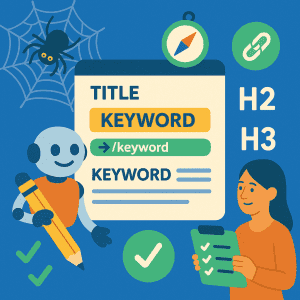How to Find the Right Terms for SEO
Keyword research is the starting point of any successful SEO strategy. It’s about understanding what your potential customers are searching for – and using that knowledge to create content that meets their needs.
In this guide, we’ll explain what keyword research is, how to do it, and how to use the results to improve your website’s performance in search engines.

🤔 What Is Keyword Research?
Keyword research is the process of discovering the words and phrases people use when they search online. These keywords help search engines understand your content and connect it with relevant search queries.
🧠 Why Keyword Research Matters
- 📈 It helps you target the right audience
- 🔍 It reveals what your potential customers care about
- 🛠️ It gives you a plan for future content
- 💷 It helps you rank higher and get more clicks – without paying for ads
🛠️ Tools for Keyword Research
You don’t need a big budget to get started. These free and low-cost tools are great for beginners:
- 🟢 Google Keyword Planner – reliable data from Google itself
- 🟡 AnswerThePublic – visual tool showing questions and topics
- 🔵 Ubersuggest – keyword ideas, volume, and competition
- 🟠 Keyword Sheeter – fast list-building from autocomplete
🔍 What to Look For in a Good Keyword
- 🎯 Relevance – Does it match your audience’s intent?
- 📊 Search volume – Are enough people searching for it?
- 📉 Competition – Is it too competitive to rank for?
- 🧵 Specificity – Long-tail keywords are often better for small sites
✍️ How to Use Keywords Effectively
- 📝 Use your main keyword in the page title, URL, and first paragraph
- 🧭 Include related keywords throughout the text naturally
- 🔗 Create supporting content to target variations of the keyword
- 📄 Use heading tags (H2, H3) to break up sections and guide readers
🚫 Keyword Research Mistakes to Avoid
- ❌ Targeting only broad, high-competition terms
- ❌ Ignoring search intent (informational vs. transactional)
- ❌ Stuffing keywords instead of writing naturally
- ❌ Not updating or reviewing keywords over time
✅ Quick Recap
- 🔍 Keyword research helps you understand your audience
- 🛠️ Free tools can give you valuable insights
- 🎯 Focus on relevance, search volume, and competition
- 📚 Use your keywords naturally in helpful, readable content
🔎 Final Thoughts
Keyword research is the essential first step in any SEO strategy, uncovering the exact phrases and questions your potential customers use. By balancing relevance, search volume and competition, you target terms that stand the best chance of ranking without getting lost in oversaturated markets.
Free tools such as Google Keyword Planner, AnswerThePublic and Ubersuggest help you generate ideas, group related topics and identify long-tail variations that capture specific user intent. Mapping each keyword to a dedicated page or blog post ensures you cover every stage of the buyer’s journey, from broad informational searches to transactional queries. Remember that quality matters: choose terms that reflect real search behaviour and align with your brand’s goals.

Implementing keyword research is not a one-off task but an ongoing cycle. Regularly review Search Console and Analytics to spot new opportunities and underperforming pages – refresh old content around emerging trends, fold in fresh long-tail variations and prune keywords that no longer deliver.
Avoid shortcuts like stuffing pages with awkward repetitions or targeting overly broad terms beyond your current reach. Instead, weave keywords naturally into headings, introductory paragraphs and image alt text, creating content that genuinely answers user queries. By treating keyword research as a continuous conversation with your audience, you’ll build a sustainable content framework that drives consistent organic growth.
Also Read:
- The History of SEO: From Keyword Stuffing to AI-Powered Search
- What Is Search Intent? The Foundation of Modern SEO
📝 Recap and Clarify: Page-Specific FAQs
What is keyword research in SEO?
Why is keyword research important?
What tools can I use for keyword research?
What’s the difference between short-tail and long-tail keywords?
What is keyword difficulty?
How many keywords should I target per page?
How can I tell if a keyword is worth targeting?
What is search intent, and why does it matter?
How often should I update my keyword research?
Is keyword research still relevant with AI search and ChatGPT?
🔁 Up Next!
SEO Writing with AI – AI tools like ChatGPT are changing how we write content—and that includes SEO. Instead of staring at a blank screen, you can now use AI to generate keyword-rich content quickly, efficiently, and creatively. But to get the best results, you still need a human touch.
Video Recap – 🔍 Keyword Research 2025 — Find the Words That Make You Rank
The secret to ranking on Google? It starts with the right words. In this video, I’ll show you how to do keyword research like a pro – finding terms your audience actually searches for, not just what you think they do.



